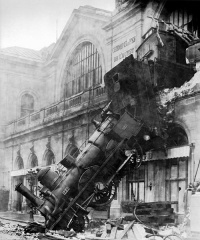Progress
From The Art and Popular Culture Encyclopedia
(Difference between revisions)
| Revision as of 21:31, 22 December 2014 Jahsonic (Talk | contribs) ← Previous diff |
Revision as of 13:14, 15 August 2019 Jahsonic (Talk | contribs) Next diff → |
||
| Line 1: | Line 1: | ||
| + | [[Image:Trylon, Perisphere and Helicline (Samuel H. Gottscho).jpg|thumb|left|200px|The [[Trylon and Perisphere]], two [[Modernist architecture|modernistic structures]] at the [[1939 New York World's Fair|New York World's Fair of 1939-1940]]<br> | ||
| + | <small>Photo: [[Trylon, Perisphere and Helicline (Samuel H. Gottscho)]]</small>]] | ||
| {| class="toccolours" style="float: left; margin-left: 1em; margin-right: 2em; font-size: 85%; background:#c6dbf7; color:black; width:30em; max-width: 40%;" cellspacing="5" | {| class="toccolours" style="float: left; margin-left: 1em; margin-right: 2em; font-size: 85%; background:#c6dbf7; color:black; width:30em; max-width: 40%;" cellspacing="5" | ||
| | style="text-align: left;" | | | style="text-align: left;" | | ||
| "[[What we call "Progress" is the exchange of one nuisance for another nuisance]]" --[[Havelock Ellis]] | "[[What we call "Progress" is the exchange of one nuisance for another nuisance]]" --[[Havelock Ellis]] | ||
| - | |} | + | <hr> |
| + | [[To boldly go where no man has gone before]] | ||
| + | |}[[Image:Train wreck at Montparnasse 1895.jpg|thumb|right|200px|''[[Train wreck at Montparnasse]]'' ([[October 22]], [[1895]]) by Studio Lévy and Sons; [[Technology]] cannot exist without the potential for accidents. For example, the invention of the locomotive also entailed the invention of derailment and French philosopoher [[Paul Virilio]] sees the accident as a negative growth of [[social positivism]] and [[scientific progress]].]] | ||
| {{Template}} | {{Template}} | ||
| - | '''Social progress''' is defined as a [[progress]] of [[society]], which makes the society better in the general view of those who attempt to cause it. The concept of social progress was introduced in the early, [[19th century]] [[social theory|social theories]], especially those of [[social evolutionists]] like [[August Comte]] and [[Herbert Spencer]]. It was present in the [[Age of Enlightenment|Enlightenment]]'s [[philosophy of history|philosophies of history]]. | ||
| - | At the time the notion of social progress was considered to be extremely [[Radicalism (historical)|radical]]. Previously, the [[social order]] was viewed as unchangeable and immutable, being [[divinity|divinely]] ordained. The [[social system]], as well as the position people held in that system, was eternal, constant and permanent (but cyclical, like the seasons). Nothing really changed, and the more it changed, the more it stayed the same; the emphasis was on seeing the constant, [[eternal]] aspects in human life. This interpretation of society was very [[conservatism|conservative]], because even if [[social change|change]] occurred, this was merely a [[superficial]] aspect of an underlying eternal social order. People were expected to remain in their station in life, without the option or chance of change. | + | '''Progress''' may refer to: |
| - | == In art and culture == | + | |
| - | *[[The Rake's Progress]] | + | *[[Progress (history)]], the idea that the [[world]] can become increasingly [[better]] in terms of [[science]], [[technology]], [[modernization]], [[liberty]], [[democracy]], [[quality of life]], etc. |
| - | *[[A Rake's Progress]] | + | **[[Social progress]], the idea that societies can or do improve in terms of their social, political, and economic structures. |
| + | **[[Scientific progress]], the idea that science increases its problem solving ability through the application of some scientific method. | ||
| + | **[[Philosophical progress]], the idea that philosophy has solved or at least can solve some of the questions it studies. | ||
| + | *[[Idea of Progress]], the theory that scientific progress drives social progress; that advances in technology, science, and social organization inevitably produce an improvement in the human condition. | ||
| + | *[[Progress trap]], the condition societies find themselves in when human ingenuity, in pursuing progress, inadvertently introduces problems that it does not have the resources to solve, preventing further progress or inciting social collapse. | ||
| + | ==Etymology== | ||
| + | From Latin ''pro-'' (“forth, before”) + ''[[gradi]]'' (“to [[walk]], [[go]]”) | ||
| + | ==See also== | ||
| + | *[[Optimism]] | ||
| {{GFDL}} | {{GFDL}} | ||
Revision as of 13:14, 15 August 2019
|
"What we call "Progress" is the exchange of one nuisance for another nuisance" --Havelock Ellis |

Train wreck at Montparnasse (October 22, 1895) by Studio Lévy and Sons; Technology cannot exist without the potential for accidents. For example, the invention of the locomotive also entailed the invention of derailment and French philosopoher Paul Virilio sees the accident as a negative growth of social positivism and scientific progress.
|
Related e |
|
Featured: |
Progress may refer to:
- Progress (history), the idea that the world can become increasingly better in terms of science, technology, modernization, liberty, democracy, quality of life, etc.
- Social progress, the idea that societies can or do improve in terms of their social, political, and economic structures.
- Scientific progress, the idea that science increases its problem solving ability through the application of some scientific method.
- Philosophical progress, the idea that philosophy has solved or at least can solve some of the questions it studies.
- Idea of Progress, the theory that scientific progress drives social progress; that advances in technology, science, and social organization inevitably produce an improvement in the human condition.
- Progress trap, the condition societies find themselves in when human ingenuity, in pursuing progress, inadvertently introduces problems that it does not have the resources to solve, preventing further progress or inciting social collapse.
Etymology
From Latin pro- (“forth, before”) + gradi (“to walk, go”)
See also
Unless indicated otherwise, the text in this article is either based on Wikipedia article "Progress" or another language Wikipedia page thereof used under the terms of the GNU Free Documentation License; or on research by Jahsonic and friends. See Art and Popular Culture's copyright notice.
.jpg)

